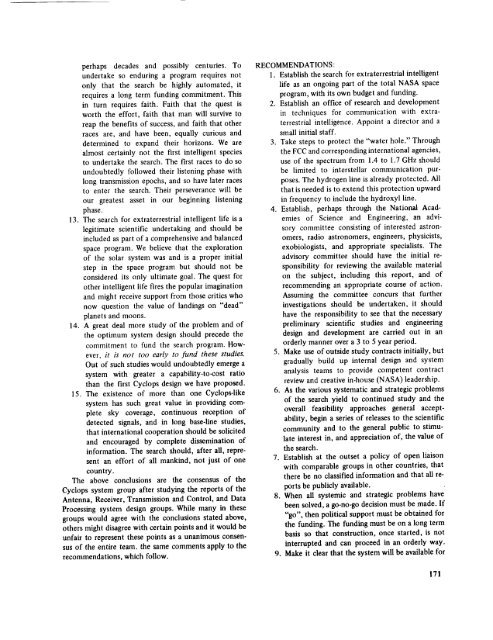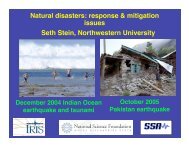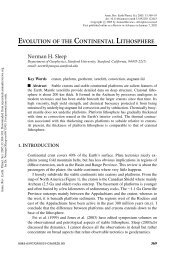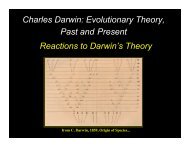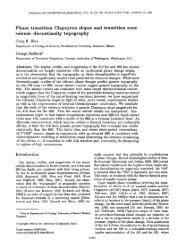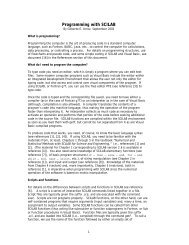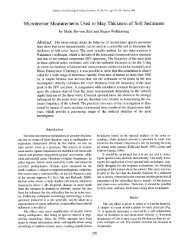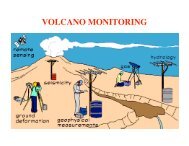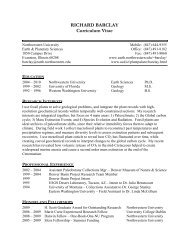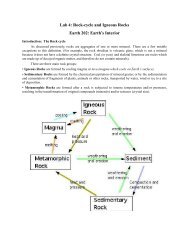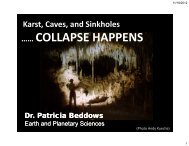Project Cyclops, A Design... - Department of Earth and Planetary ...
Project Cyclops, A Design... - Department of Earth and Planetary ...
Project Cyclops, A Design... - Department of Earth and Planetary ...
You also want an ePaper? Increase the reach of your titles
YUMPU automatically turns print PDFs into web optimized ePapers that Google loves.
perhapsdecades<strong>and</strong> possiblycenturies.To<br />
undertakesoenduringa programrequiresnot<br />
only that thesearchbe highlyautomated, it<br />
requiresalongtermfundingcommitment. This<br />
in turn requires faith. Faith that the quest is<br />
worth the effort, faith that man will survive to<br />
reap the benefits <strong>of</strong> success, <strong>and</strong> faith that other<br />
races are, <strong>and</strong> have been, equally curious <strong>and</strong><br />
determined to exp<strong>and</strong> their horizons. We are<br />
almost certainly not the first intelligent species<br />
to undertake the search. The first races to do so<br />
undoubtedly followed their listening phase with<br />
long transmission epochs, <strong>and</strong> so have later races<br />
to enter the search. Their perseverance will be<br />
our greatest asset in our beginning listening<br />
phase.<br />
13. The search for extraterrestrial intelligent life is a<br />
legitimate scientific undertaking <strong>and</strong> should be<br />
included as part <strong>of</strong> a comprehensive <strong>and</strong> balanced<br />
space program. We believe that the exploration<br />
<strong>of</strong> the solar system was <strong>and</strong> is a proper initial<br />
step in the space program but should not be<br />
considered its only ultimate goal. The quest for<br />
other intelligent life fires the popular imagination<br />
<strong>and</strong> might receive support from those critics who<br />
now question the value <strong>of</strong> l<strong>and</strong>ings on "dead"<br />
planets<br />
<strong>and</strong> moons.<br />
14. A great deal more study <strong>of</strong> the problem <strong>and</strong> <strong>of</strong><br />
the optimum system design should precede the<br />
commitment to fund the search program. However,<br />
it is not too early to fund these studies.<br />
Out <strong>of</strong> such studies would undoubtedly emerge a<br />
system with greater a capability-to-cost ratio<br />
than the first <strong>Cyclops</strong> design we have proposed.<br />
15. The existence <strong>of</strong> more than one <strong>Cyclops</strong>-like<br />
system has such great value in providing complete<br />
sky coverage, continuous reception <strong>of</strong><br />
detected signals, <strong>and</strong> in long base-line studies,<br />
that international cooperation should be solicited<br />
<strong>and</strong> encouraged by complete dissemination <strong>of</strong><br />
information. The search should, after all, represent<br />
an effort <strong>of</strong> all mankind, not just <strong>of</strong> one<br />
country.<br />
The above conclusions are the consensus <strong>of</strong> the<br />
<strong>Cyclops</strong> system group after studying the reports <strong>of</strong> the<br />
Antenna, Receiver, Transmission <strong>and</strong> Control, <strong>and</strong> Data<br />
Processing system design groups. While many in these<br />
groups would agree with the conclusions stated above,<br />
others might disagree with certain points <strong>and</strong> it would be<br />
unfair to represent these points as a unanimous consensus<br />
<strong>of</strong> the entire team, the same comments apply to the<br />
recommendations, which follow.<br />
RECOMMENDATIONS:<br />
I. Establish the search for extraterrestrial intelligent<br />
life as an ongoing part <strong>of</strong> the total NASA space<br />
program, with its own budget <strong>and</strong> funding.<br />
2. Establish an <strong>of</strong>fice <strong>of</strong> research <strong>and</strong> development<br />
in techniques for communication with extraterrestrial<br />
intelligence. Appoint a director <strong>and</strong> a<br />
small initial staff.<br />
3. Take steps to protect the "water hole." Through<br />
the FCC <strong>and</strong> corresponding international agencies,<br />
use <strong>of</strong> the spectrum from 1.4 to 1.7 GHz should<br />
be limited to interstellar communication purposes.<br />
The hydrogen line is already protected. All<br />
that is needed is to extend this protection upward<br />
in frequency to include the hydroxyl line.<br />
4. Establish, perhaps through the National Academies<br />
<strong>of</strong> Science <strong>and</strong> Engineering, an advisory<br />
committee consisting <strong>of</strong> interested astronomers,<br />
radio astronomers, engineers, physicists,<br />
exobiologists, <strong>and</strong> appropriate specialists. The<br />
advisory committee should have the initial responsibility<br />
for reviewing the available material<br />
on the subject, including this report, <strong>and</strong> <strong>of</strong><br />
recommending an appropriate course <strong>of</strong> action.<br />
Assuming the committee concurs that further<br />
investigations should be undertaken, it should<br />
have the responsibility to see that the necessary<br />
preliminary scientific studies <strong>and</strong> engineering<br />
design <strong>and</strong> development are carried out in an<br />
orderly manner over a 3 to 5 year period.<br />
5. Make use <strong>of</strong> outside study contracts initially, but<br />
gradually build up internal design <strong>and</strong> system<br />
analysis teams to provide competent contract<br />
review <strong>and</strong> creative in-house (NASA) leadership.<br />
6. As the various systematic <strong>and</strong> strategic problems<br />
<strong>of</strong> the search yield to continued study <strong>and</strong> the<br />
overall feasibility approaches general acceptability,<br />
begin a series <strong>of</strong> releases to the scientific<br />
community <strong>and</strong> to the general public to stimulate<br />
interest in, <strong>and</strong> appreciation <strong>of</strong>, the value <strong>of</strong><br />
the search.<br />
7. Establish at the outset a policy <strong>of</strong> open liaison<br />
with comparable groups in other countries, that<br />
there be no classified information <strong>and</strong> that all reports<br />
be publicly available.<br />
8. When all systemic <strong>and</strong> strategic problems have<br />
been solved, a go-no-go decision must be made. If<br />
"go", then political support must be obtained for<br />
the funding. The funding must be on a long term<br />
basis so that construction, once started, is not<br />
interrupted <strong>and</strong> can proceed in an orderly way.<br />
9. Make it clear that the system will be available for<br />
171


